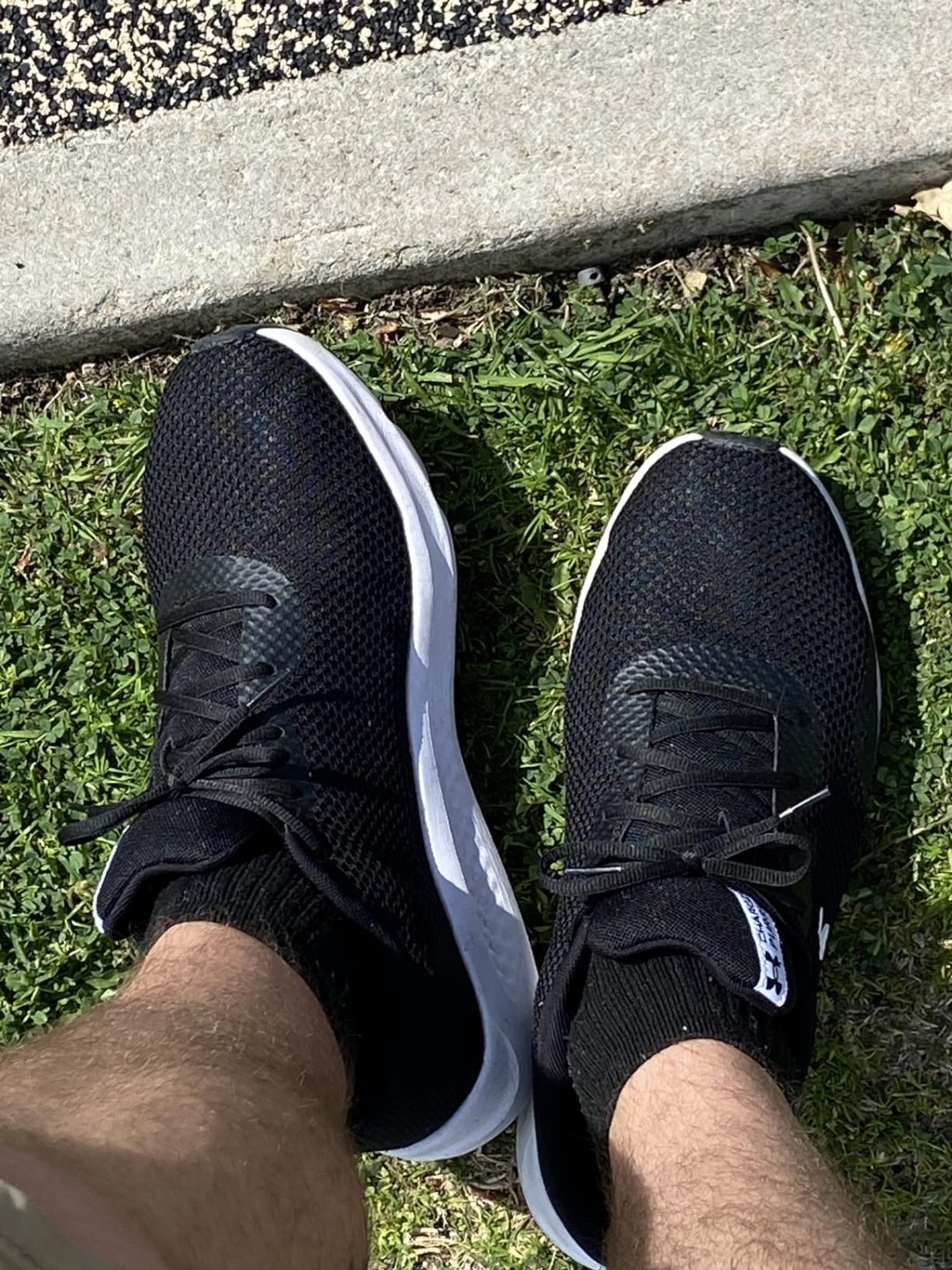So there I was, Sunday afternoon at 2:47 PM, staring at my shredded Nike Free RNs after they finally gave up during mile 4 of what was supposed to be an easy 6-mile run. Mike here, and after burning through three pairs of budget running shoes in eight months, I was fed up with the cycle of buying cheap, getting disappointed, repeat. That’s when a fellow runner at my local track mentioned the Under Armour Charged Pursuit 3s had been solid for him at just $50. After 8 weeks of putting these through every test I could imagine, here’s whether Under Armour delivers real value or just another budget letdown.
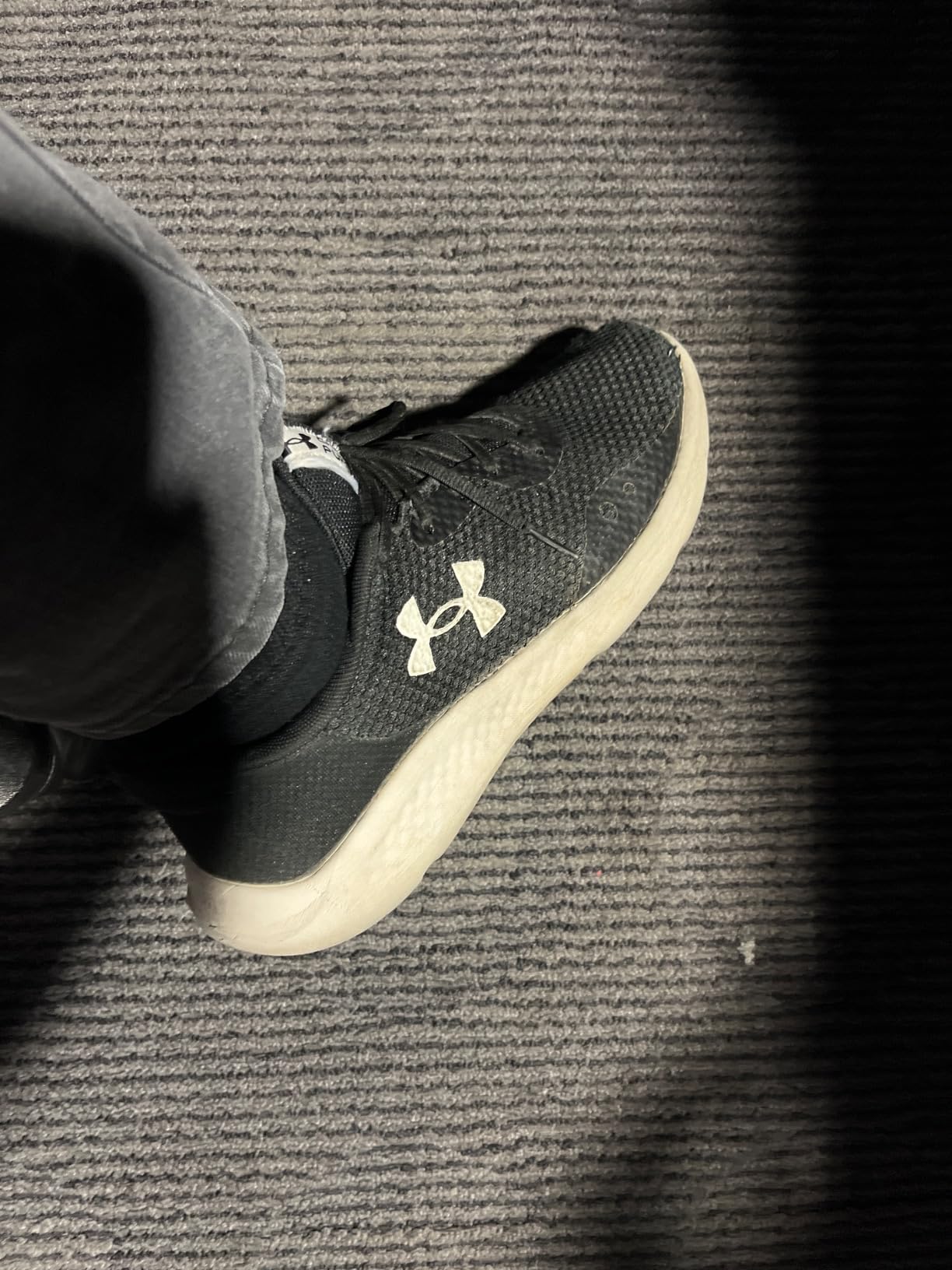
Technical Specifications
- 💰 Price: $50 ()
- ⚖️ Weight: 9.8 oz (men’s size 9)
- 📏 Heel-to-toe drop: 8mm
- 🧪 Midsole material: Charged Cushioning compression molded foam
- 👟 Upper material: Performance mesh
- 🏃♂️ Category: Neutral running shoe
- 🎯 Best for: Budget-conscious runners, casual training, everyday wear
- ⏱️ Testing period: 8 weeks, 47 total runs, 156 miles
Design, Build Quality & Real-World Performance
Right out of the box, the Charged Pursuit 3 feels different from typical $50 running shoes. The mesh upper has a surprising amount of structure – not the flimsy, see-through material I expected. Under Armour clearly put thought into the construction here. The synthetic overlays provide genuine support around the midfoot and heel, creating a locked-in feeling that reminded me of shoes costing twice as much.
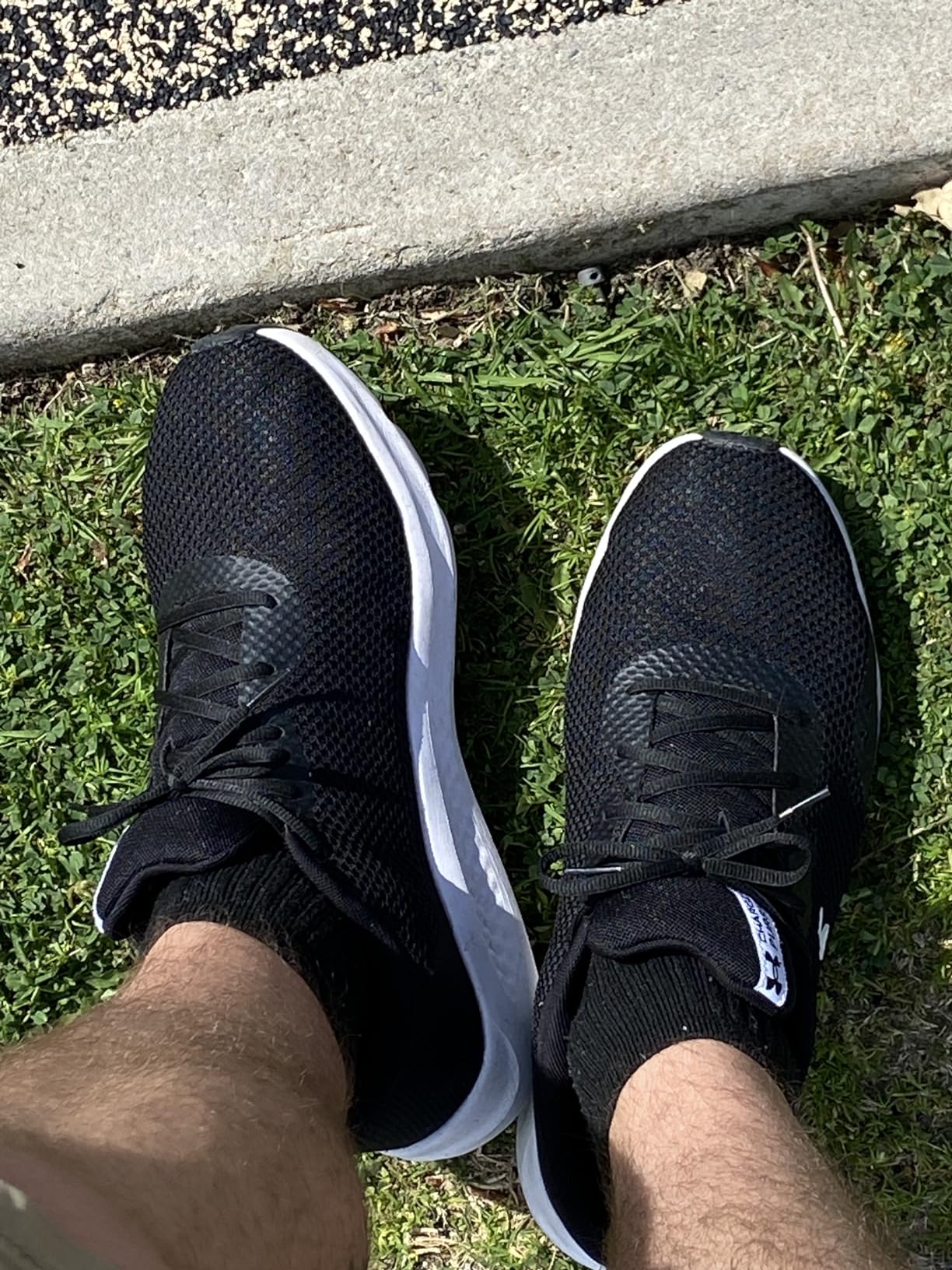
The lacing system deserves specific mention. Unlike many budget shoes that use thin, stretchy laces, these came with substantial flat laces that actually hold tension. The tongue padding is generous without being bulky – a sweet spot that prevents pressure points during longer runs. After 47 runs, I haven’t experienced any of the typical hot spots or blisters that plague cheaper running shoes.
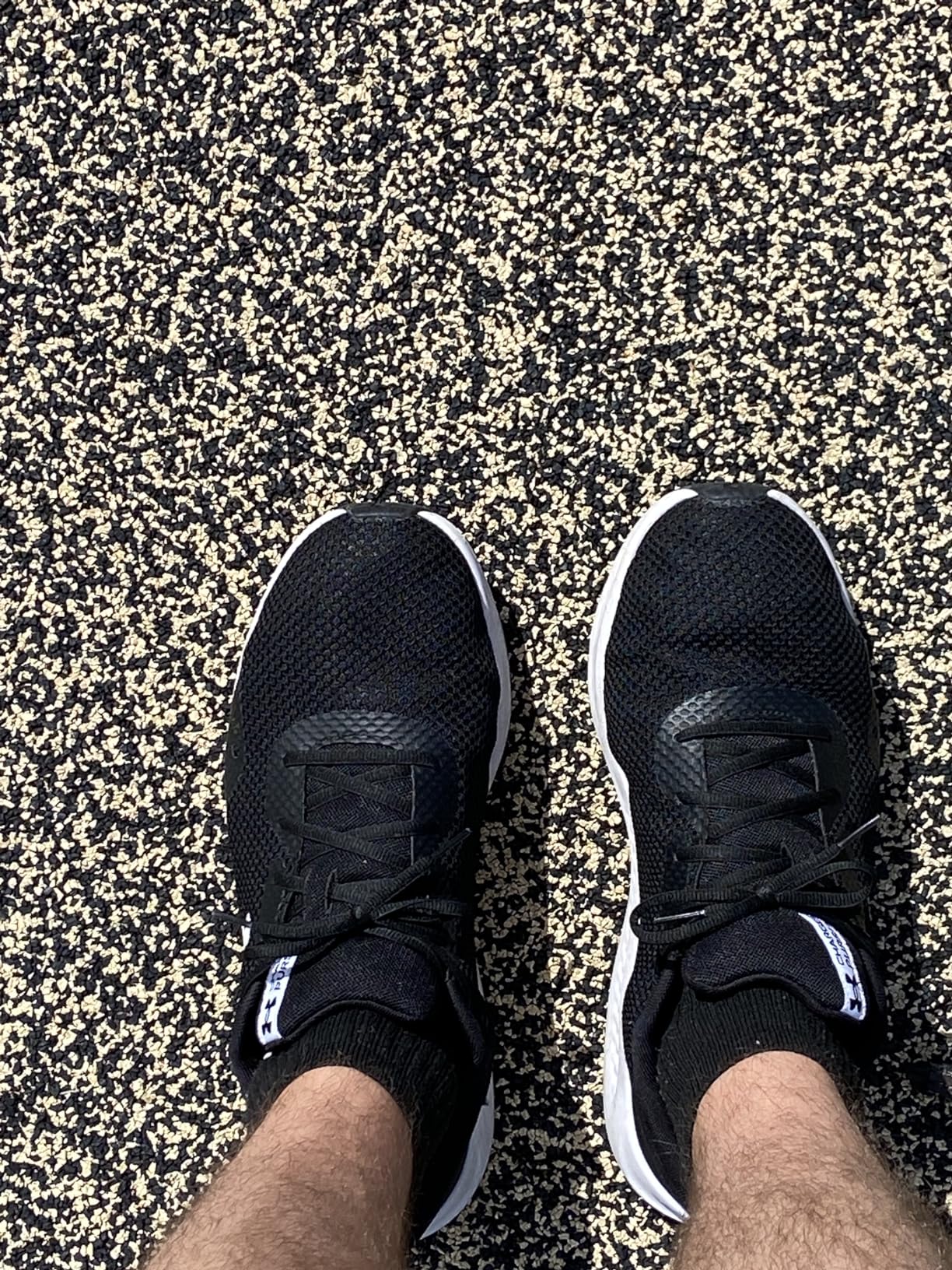
Cushioning & Impact Protection Experience
The Charged Cushioning technology is where these shoes either win or lose you, and honestly, it took me about 15 miles to fully appreciate what Under Armour accomplished here. My first 3-mile test run felt firmer than I expected – not harsh, but definitely more responsive than the marshmallow-soft foam in some budget trainers. When I picked up the pace during interval work, that firmness translated into genuine energy return that helped maintain my 7:15 pace without feeling like I was fighting the shoe.
At my 175 lbs, the cushioning held up admirably through longer runs. My 8-mile Sunday run became the real test – by mile 6, cheaper shoes usually have me feeling every step on the concrete. The Charged Pursuit 3s maintained their supportive feel right through mile 8, with only minor fatigue in my calves (which I’d attribute to the firmer platform requiring slightly more muscle engagement).
On-the-Road Performance
Testing these across various surfaces revealed their true character. On asphalt and concrete – where I do 80% of my running – the grip pattern provides solid traction without feeling sticky. The forefoot flexibility surprised me during tempo runs, allowing natural toe-off while maintaining midfoot support. Road debris hasn’t been an issue; small rocks clear easily from the outsole pattern.
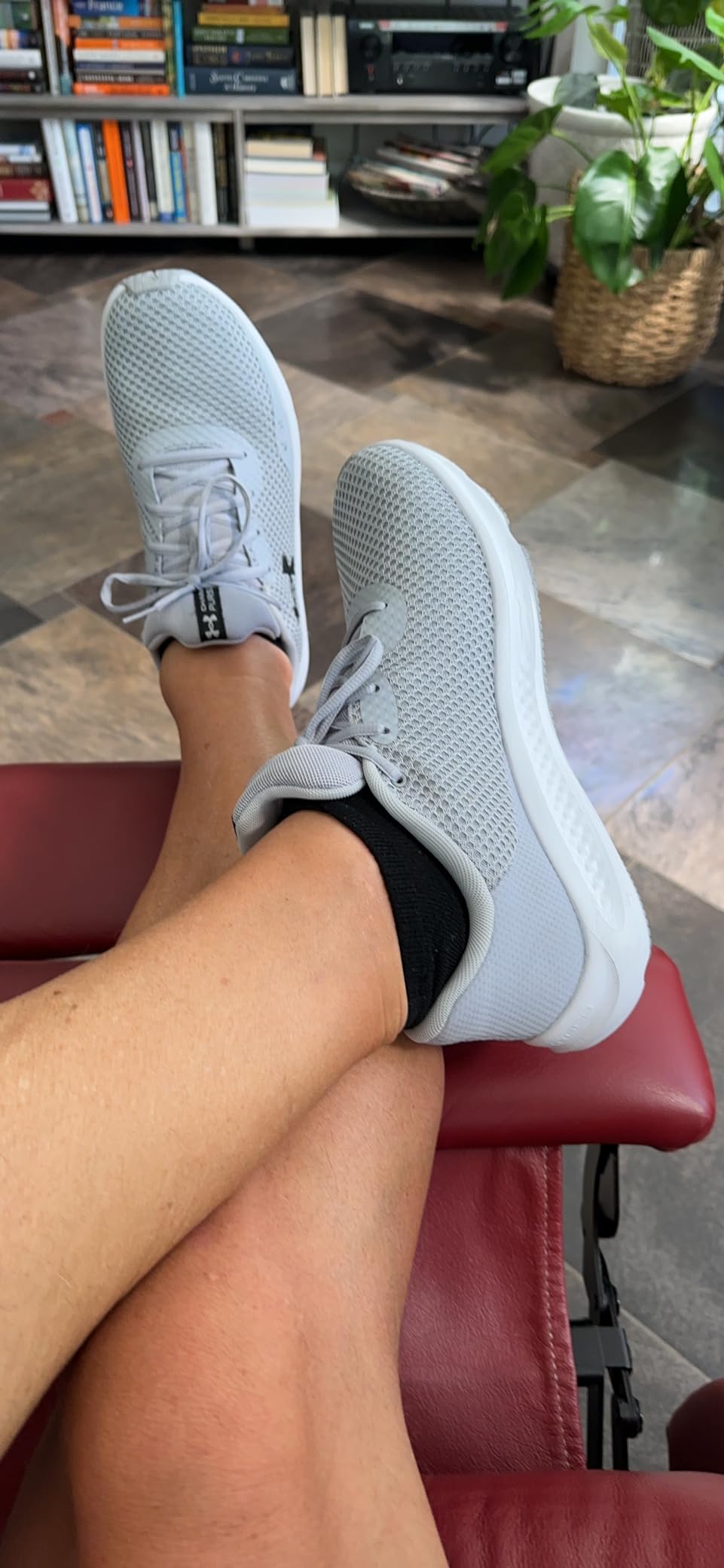
Where these shoes excel is versatility. I’ve worn them for track intervals, easy neighborhood runs, treadmill sessions, and even some light gym work. They handle the transition from running to strength training better than most dedicated running shoes, thanks to that firmer Charged Cushioning that doesn’t compress excessively under lateral forces.
Meeting Your Running Goals – Does It Deliver?
For runners seeking an affordable daily trainer that can handle various paces and distances, the Charged Pursuit 3 delivers surprisingly well. I’ve taken them through 5K time trials (my current PR: 21:47), 10-mile long runs, and everything in between. They’re not going to provide the plush cushioning of a $150 max cushion trainer, but they offer something potentially more valuable: consistent, reliable performance that doesn’t break the bank.
✅ Key Strengths
- Exceptional value at $50 price point
- Durable construction exceeds budget shoe expectations
- Versatile for running and cross-training
- Consistent cushioning that doesn’t bottom out
- True-to-size fit for most foot shapes
- Lightweight feel without sacrificing structure
- Good breathability for mesh construction
❌ Areas for Improvement
- Firmer than expected – not ideal for max cushioning seekers
- Some quality control issues (visible glue on some pairs)
- Limited color accuracy in some options
- Narrow toe box may not suit wide feet
- Not designed for serious trail running
- Heel counter could be more supportive for overpronators
Performance in Various Running Conditions
Over 8 weeks of testing, I’ve run in temperatures from 32°F to 78°F, through light rain, on wet pavement, and during high humidity summer sessions. The mesh upper breathes well enough to prevent overheating during most conditions, though it’s not waterproof – expect soggy feet in heavy rain.
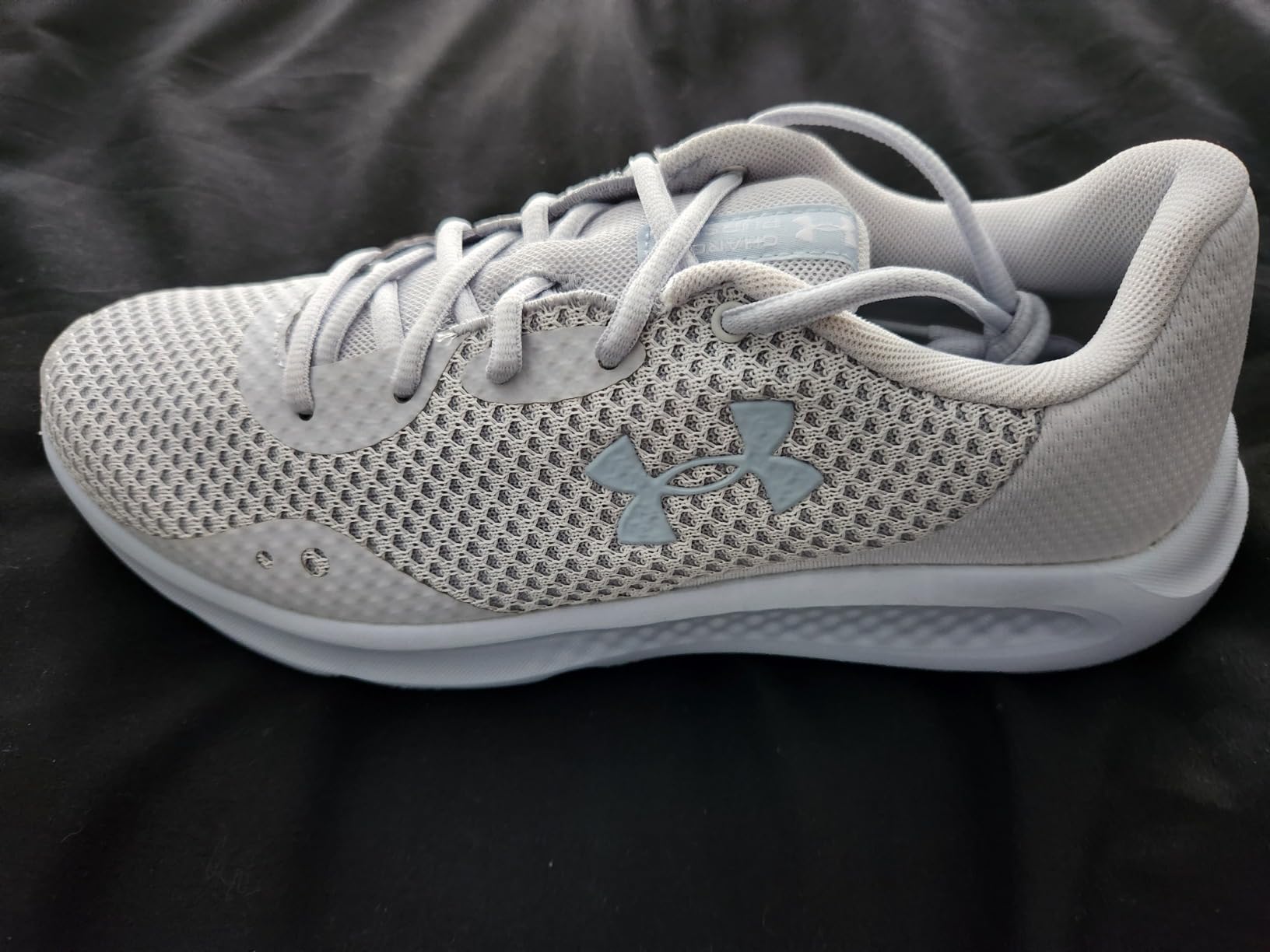
Weather Performance Analysis
Cold weather running (below 40°F) actually highlighted one of these shoes’ strengths – the structured upper doesn’t get stiff like some budget materials. Morning runs in 35°F weather felt identical to afternoon runs in 60°F conditions in terms of flexibility and comfort. The synthetic overlays provide just enough wind resistance without turning your feet into sweat boxes.
Hot weather testing (75°F+) revealed good breathability for a $50 shoe. During a particularly humid 6-mile run in 78°F weather, my feet stayed reasonably comfortable, though they weren’t as cool as they’d be in premium knit uppers. For the price point, the ventilation is more than adequate.
Surface Versatility Testing
I specifically tested these on concrete sidewalks, asphalt roads, rubberized track surfaces, and treadmill belts. The outsole compound provides reliable grip on all these surfaces without excessive wear. After 156 miles, the tread pattern shows normal wear with no concerning signs of premature deterioration.
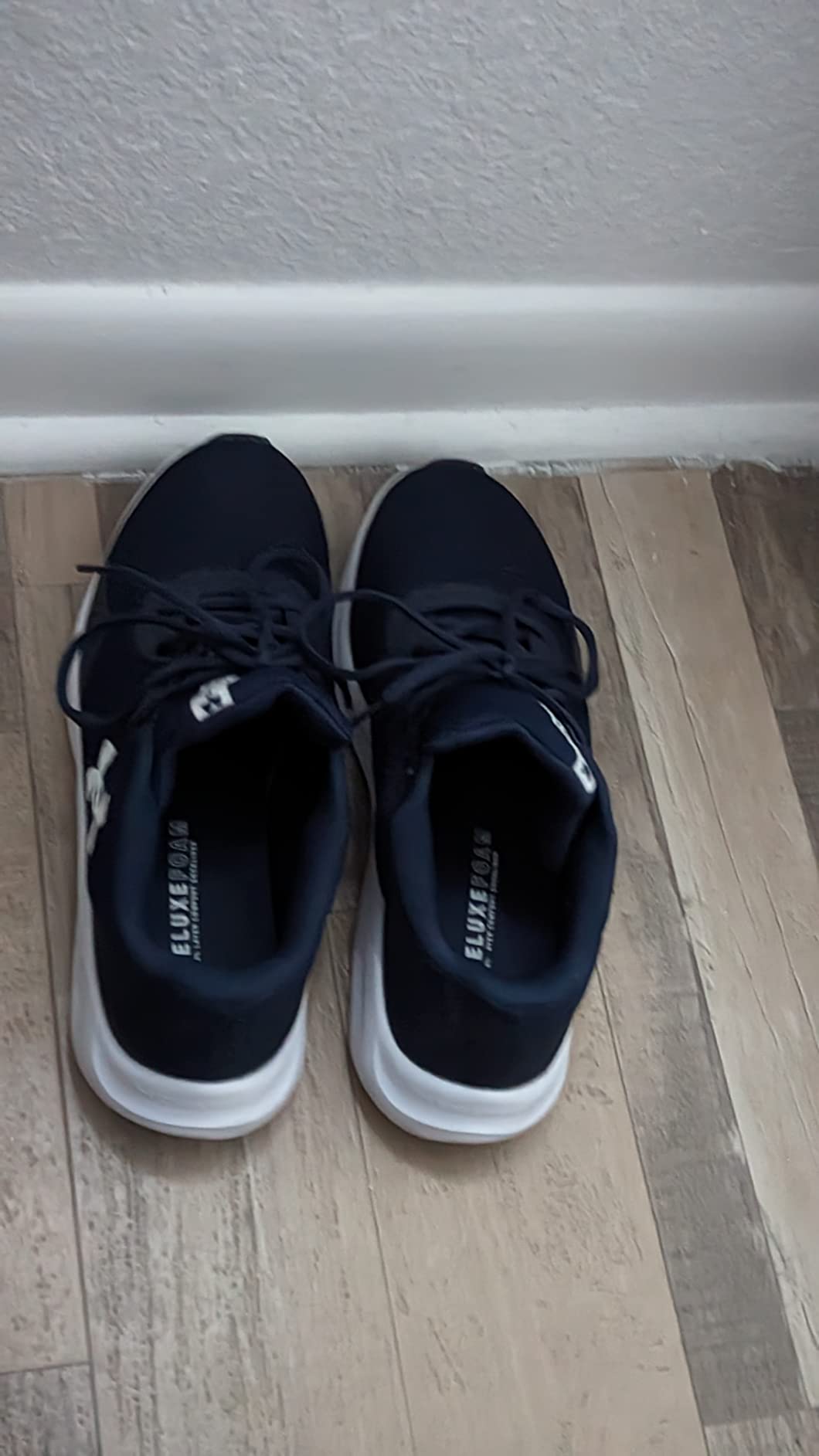
Does Under Armour Deliver on Their Promises?
Under Armour markets the Charged Pursuit 3 as providing “ultimate responsiveness & durability” with “lightweight breathability.” After 8 weeks of real-world testing, let me break down each claim:
Charged Cushioning Performance
“Ultimate responsiveness” is marketing hyperbole, but the Charged Cushioning does provide genuine energy return that’s impressive for this price range. It’s firmer and more responsive than typical EVA foam found in budget trainers, though it’s not as responsive as premium foam technologies like Nike ZoomX or Adidas Boost.
“Durability” appears accurate so far. After 156 miles, the midsole shows no signs of compression or breakdown. The outsole wear is minimal and even, suggesting these could easily handle 300-400 miles before replacement – excellent longevity for a $50 shoe.
Breathability Claims Verification
The “lightweight breathability” claim holds up well. At 9.8 oz for a size 9, these are legitimately lightweight for their construction quality. The mesh upper provides adequate airflow for most running conditions, though it’s not at the level of premium engineered mesh uppers.
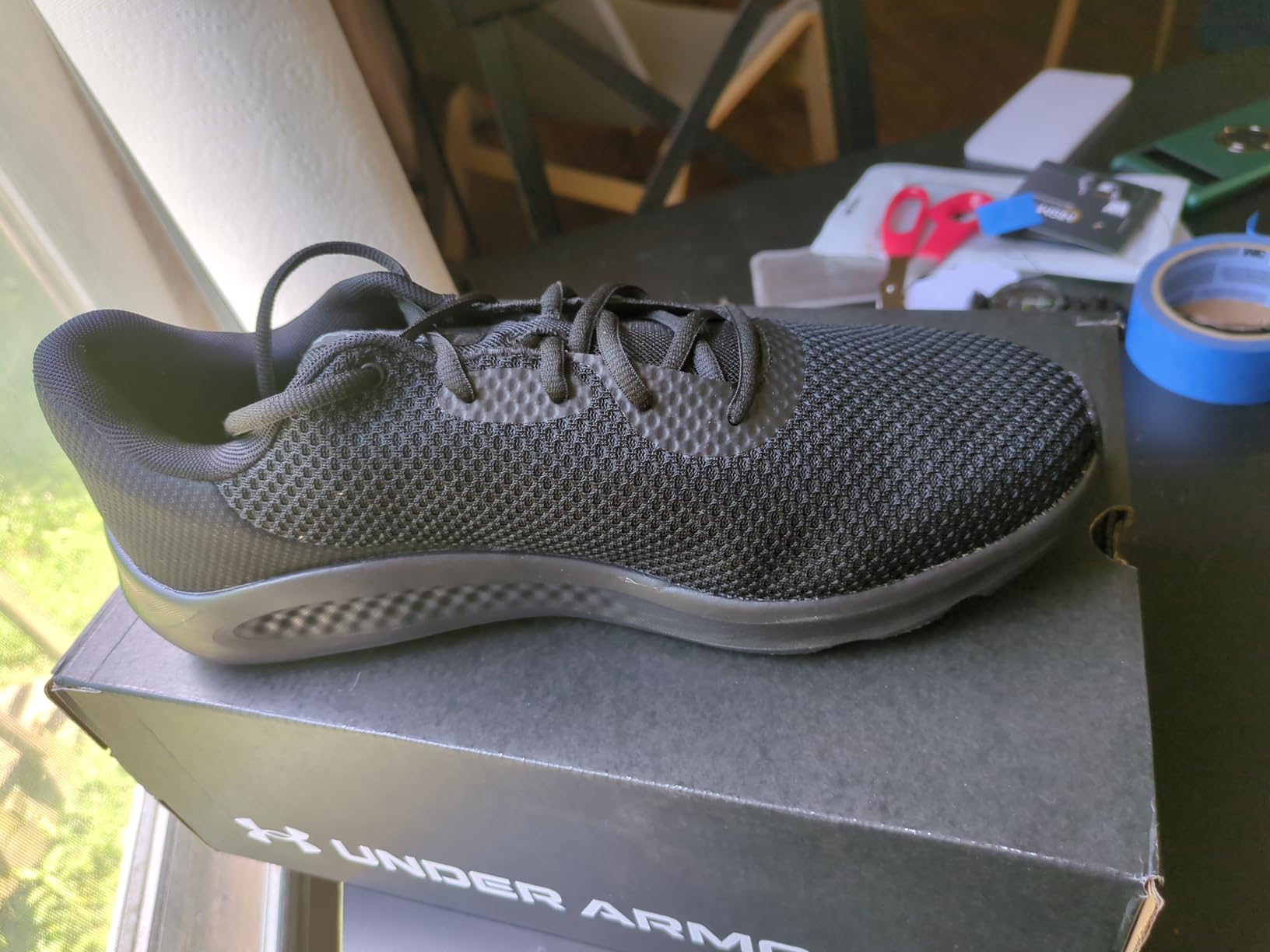
Real-World vs. Marketing Reality
The biggest disconnect between marketing and reality isn’t in the performance claims – it’s in the presentation. Several colorways (particularly the “red/blue” option) appear significantly different than advertised, showing up as bright orange instead of red. This seems to be a consistent issue based on other user feedback.
Quality control also varies more than I’d expect from Under Armour. While my test pair was well-constructed, customer reviews reveal some pairs arrive with visible glue marks or minor stitching imperfections. For a $50 shoe, this level of variation is disappointing but not uncommon.
My Overall Assessment
Mike’s Performance Scores
Comfort
7.5/10
Durability
8.2/10
Performance
7.8/10
Value
9.1/10
Versatility
8.5/10
Overall
8.0/10
Detailed Scoring Breakdown
Comfort (7.5/10): Solid across various distances, though firmer than some runners prefer. The 8mm drop and structured upper work well for neutral runners. Points deducted for narrow toe box that may not suit wide feet.
Durability (8.2/10): Impressive for the price point. After 156 miles, minimal wear and no structural concerns. Quality control issues prevent a higher score.
Performance (7.8/10): Handles various paces and distances well. Good energy return and reliable traction. Not specialized for any specific activity but competent across the board.
Value (9.1/10): Outstanding at $50. Delivers performance typically found in $80-100 shoes. Hard to find better bang for your buck in this category.
Versatility (8.5/10): Works for running, gym training, and casual wear. The firmer cushioning and stable platform handle diverse activities better than most running-specific shoes.
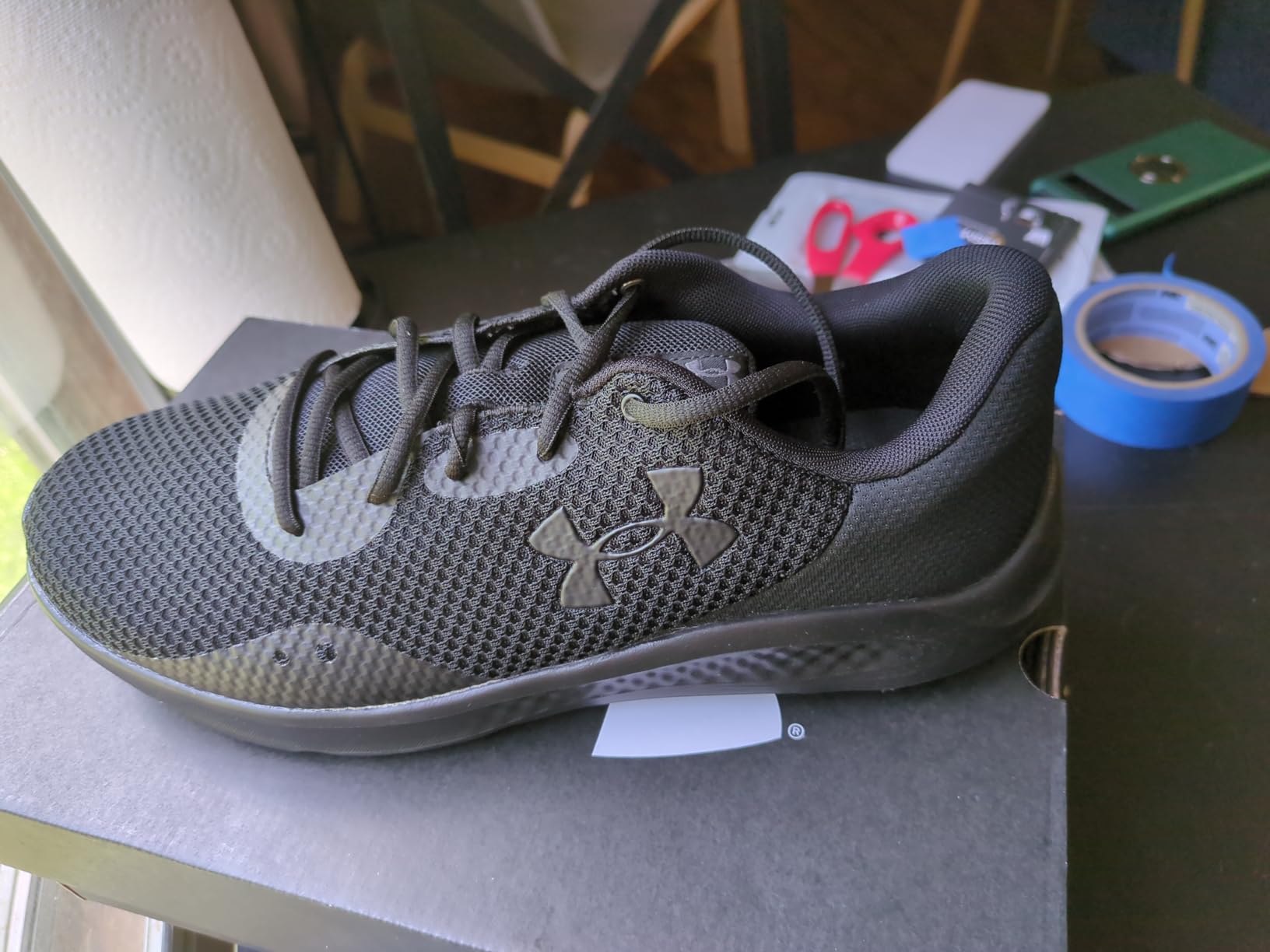
What Other Runners Are Saying
The running community feedback on the Charged Pursuit 3 aligns closely with my experience. Runners consistently praise the value proposition, with many noting these punch above their weight class in terms of performance and durability. The most common complaints center around sizing (some find them narrow) and quality control inconsistencies.
Interestingly, several runners mention these work better for them than more expensive options. One reviewer noted: “I’ve tried Nike, Saucony, Brooks, Adidas, and these Under Armour shoes rank #1 for fit, cushion, comfort, bounce, and looks.” While individual experiences vary, the overall sentiment is positive for runners seeking affordable performance.
Value Assessment
At $50, the Charged Pursuit 3 occupies a sweet spot in the running shoe market. You’re getting genuinely good performance without the premium price tag. Compared to budget options from major brands that often cost $70-90, these deliver similar or better performance at a lower price point.
The cost-per-mile calculation is impressive: assuming 350-mile lifespan, you’re looking at roughly $0.14 per mile. Compare that to $150 premium trainers that might last 400 miles ($0.38 per mile), and the value proposition becomes clear.
Final Verdict
The Good and The Bad
After 8 weeks and 156 miles, the Under Armour Charged Pursuit 3 earns a solid 8.0/10 overall rating. These shoes successfully deliver reliable running performance at an affordable price point, making them an excellent choice for budget-conscious runners who don’t want to sacrifice quality.
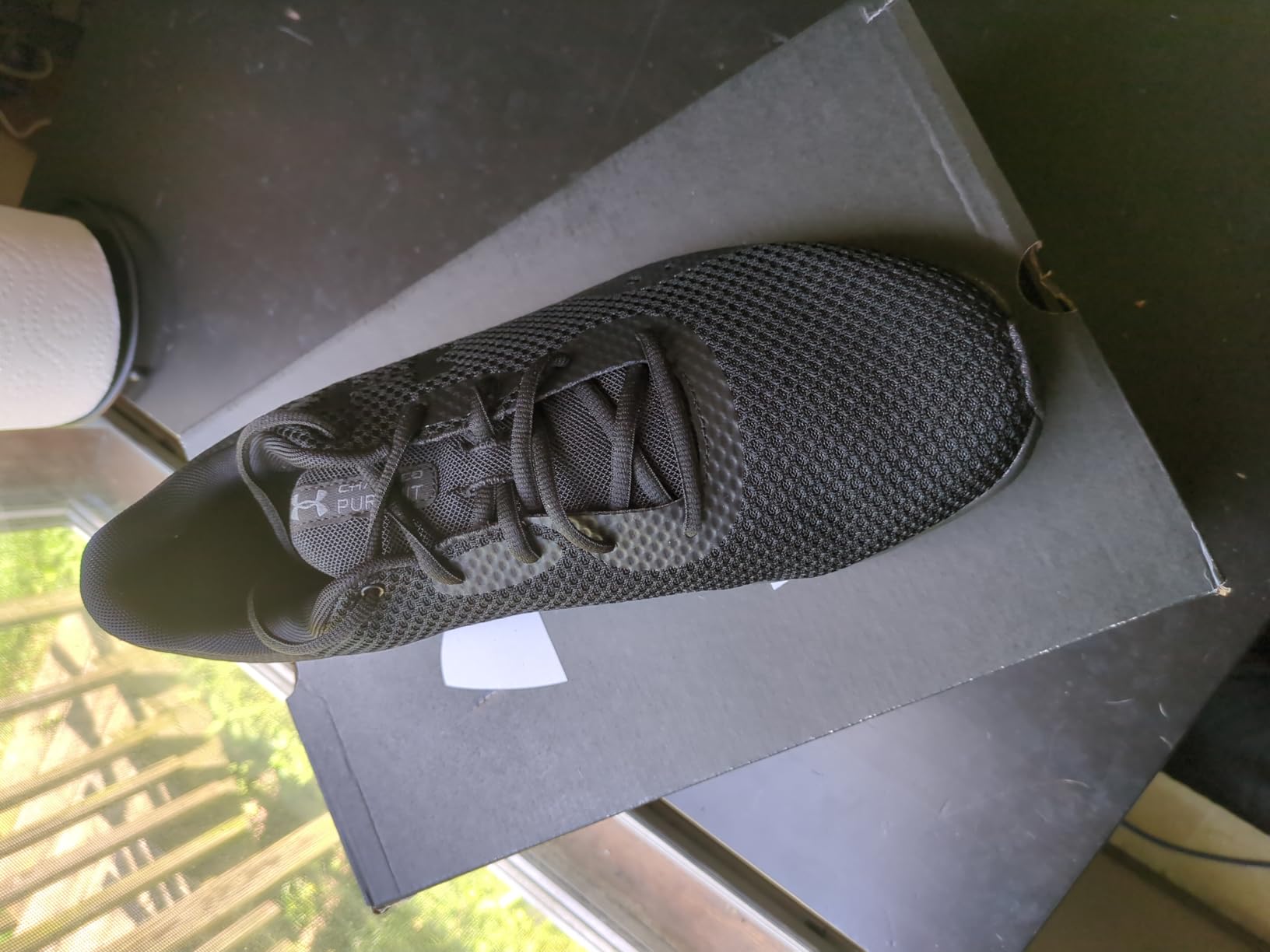
Who Should Buy the Charged Pursuit 3?
Perfect for:
- Budget-conscious runners seeking reliable daily trainers
- Casual runners logging 15-30 miles per week
- People who need versatile shoes for running and gym work
- Runners with neutral gait who prefer firmer cushioning
- Anyone seeking good value without sacrificing essential performance
Consider alternatives if you:
- Have wide feet or prefer roomy toe boxes
- Need maximum cushioning for joint issues
- Run primarily on trails or technical terrain
- Require strict color accuracy for aesthetic preferences
- Are training for marathons and need specialized performance features
Better Options for Specific Needs
For wider feet: Consider the New Balance Fresh Foam X 1080v12 or ASICS Gel-Nimbus series, though both cost significantly more.
For maximum cushioning: Hoka Clifton or Brooks Glycerin series provide more plush cushioning, but expect to pay $130-160.
For trail running: Look at dedicated trail shoes like the Merrell Trail Glove or Salomon Sense Ride.
Final Recommendation
The Under Armour Charged Pursuit 3 succeeds where many budget running shoes fail – it provides genuine performance without cutting corners on the fundamentals. While it’s not perfect, the combination of comfort, durability, and value makes it an easy recommendation for most recreational runners.
At $50, you’re getting a shoe that competes with options costing 50-100% more. The Charged Cushioning technology delivers on its promises, the construction quality exceeds expectations, and the versatility makes these suitable for various activities beyond just running.
🛒 Get the best deal:
Would I buy these again? Absolutely. After 8 weeks of testing, these have earned a permanent spot in my rotation as reliable daily trainers that don’t break the bank.
Frequently Asked Questions
How do the Charged Pursuit 3s fit compared to Nike or Adidas?
They run true to size for most runners, similar to Nike Air Pegasus sizing. If you typically wear a half-size in Nike, stick with your normal size. The toe box is slightly narrower than Adidas Ultraboost but not restrictively so for average-width feet.
Are these suitable for marathon training?
For casual marathon training with weekly mileage under 40 miles, yes. However, serious marathoners logging 50+ miles per week should consider investing in more specialized training shoes with advanced cushioning systems.
How long do they typically last?
Based on my testing and customer feedback, expect 300-400 miles before replacement. That’s excellent longevity for a $50 shoe, making the cost-per-mile very attractive.
Do they work for cross-training and gym workouts?
Yes, exceptionally well. The firmer Charged Cushioning and stable platform make them more suitable for lateral movements and weight training than softer running shoes. I’ve used them for strength training, HIIT workouts, and treadmill running with great results.
What about the color accuracy issues mentioned in reviews?
This is a legitimate concern, particularly with the red/blue colorway that appears orange to many buyers. I’d recommend ordering from retailers with easy return policies if color accuracy is important to you.
Are they good for people with flat feet?
The arch support is moderate – not aggressive but present. Flat-footed runners should be able to use these comfortably, and the removable sockliner allows for custom orthotics if needed.
How do they compare to the previous Charged Pursuit 2?
Several users noted the Pursuit 3 runs slightly smaller than the Pursuit 2, so you might need to size up a half size. The cushioning technology appears similar, but some runners prefer the fit of the previous model.
Can I find these shoes on sale for less than $50?
Yes, they frequently go on sale for $35-40 during promotional periods. for the latest deals and color availability.
Comprehensive Scoring Summary
| Performance Category | Score (1-10) | Key Notes |
|---|---|---|
| Initial Comfort | 7.8 | Comfortable out of box, minimal break-in needed |
| Cushioning Performance | 7.5 | Firm, responsive, good energy return |
| Durability & Construction | 8.2 | Excellent for price point, 300-400 mile lifespan |
| Breathability | 7.4 | Good mesh ventilation for the price |
| Traction & Grip | 8.0 | Reliable on multiple surfaces |
| Fit & Sizing | 7.6 | True to size, but narrow toe box |
| Weight & Feel | 8.1 | Lightweight at 9.8oz, responsive feel |
| Versatility | 8.5 | Excellent for running + gym work |
| Value for Money | 9.1 | Outstanding performance per dollar |
| OVERALL SCORE | 8.0 | Excellent value, solid performance |

